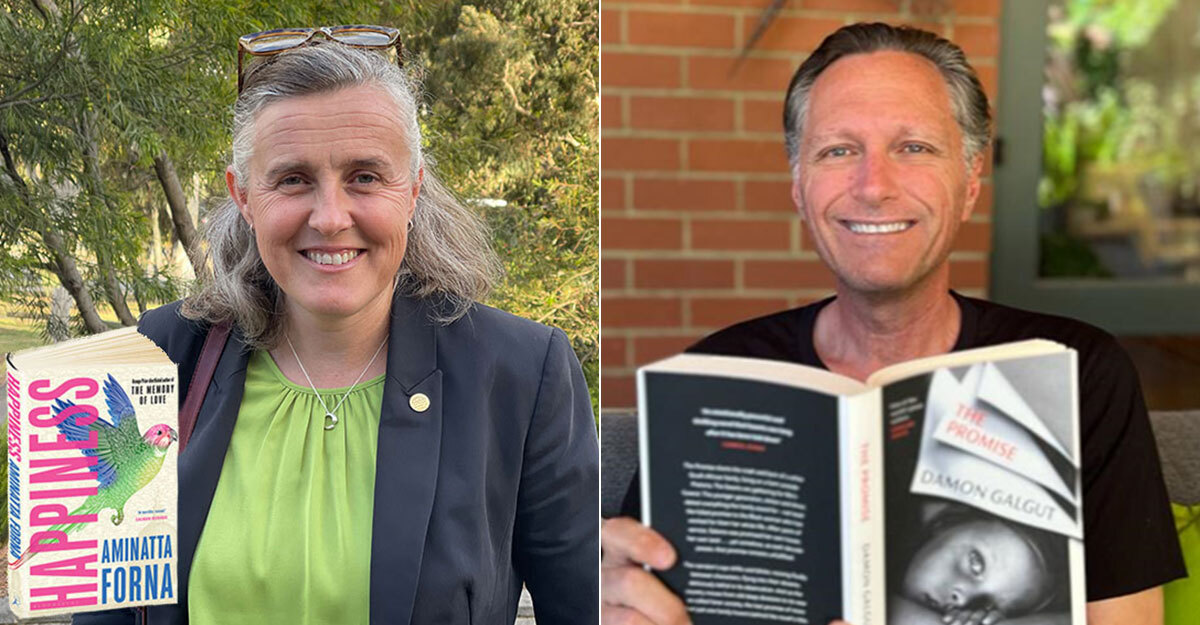Stories for summer: Academy Fellows reveal their reading, listening and viewing recommendations
- 4 mins read


From the germination of 2,000-year-old Judean date palms to tales of beekeepers in the Ukrainian-Russian ‘grey zone’, the Australian Academy of Science’s 7th annual Fellows’ reading, listening and viewing list reveals the diverse interests of Australia’s leading scientists.
Whether you’re looking to dive into hidden histories of Australian science, imagined interactions with child-like machines, or the oddities of the English language—there’s something for everyone in this year’s list.
- See the Fellows’s reading, listening and viewing list
Below is a snapshot of this year’s recommendations.
Books
Happiness, by Aminatta Forna
Recommended by Professor Naomi McClure-Griffiths FAA: This is an amazing novel focusing on two people, Jean and Attila, from very different backgrounds whose lives intersect in London for a few days. The story dabbles into Jean’s research on urban foxes in London and Attila’s work as a psychiatrist in war zones, while wrapping in the challenges of life in late middle age, including loves lost or faded.
The Promise, by Damon Galgut
Recommended by Professor Jonathan Carapetis AM FAA FAHMS: A magnificently written tale of a family unravelling in parallel with the unravelling of apartheid in South Africa and following them over decades. Seamlessly moves between the perspectives of the main characters with wit, sarcasm and an ability to tug at the heartstrings too.
The Age of Seeds, by Fiona McMillan-Webster
Recommended by Dr Elizabeth Truswell FAA: A popular science book well written and hard to put down. Beginning with the germination of 2,000-year-old Judean date palms and dealing with the complexity of dormancy, the author also uses local examples such as the Pink Flannel Flowers of the Blue Mountains. Seed dispersal, longevity, the history of seed banks and seeds in relation to the history of human agriculture are all covered in this lively text.
Grey Bees, by Andrey Kurkov
Recommended by Professor Tony Basten AO FAA FTSE: This delightfully written and topical novel from Ukraine’s best-known author describes what life is like in the so called ‘grey zone’ between the Ukrainian and Russian lines in the Donesk region of Ukraine. A Ukrainian beekeeper and a Russian separatist live in an uneasy peace on opposite sides of a bombed-out village haunted by the daily exchange of missile and artillery fire. In a brief respite, the beekeeper takes himself and his bees to Crimea for a holiday where he faces a hostile reception.
The Wizards of Oz: How Oliphant and Florey Helped Win the War and Shape the Modern World, by Brett Mason
Professor Brian Schmidt AC FAA FRS Nobel Laureate: Brett Mason’s Wizards of Oz I think should be made part of the Australian curriculum, and should be read by anyone interested in Australian scientific history. It tells the story of how two Australians, Oliphant and Florey, made three of the arguably most profound technical contributions to World War II, and changed the course of the war. Hard to put down once you start, it will forever change your outlook on the impact of Australian science.”
Professor Margaret Sheil AO FAA FTSE: This book details the parallel lives and impact on the war effort and beyond of Howard Florey and Mark Oliphant in an engaging and informative style. While Florey’s contribution in developing penicillin is well recognised, less is known about the contributions of Oliphant’s role in critical radar technologies and in raising awareness of the feasibility of nuclear weapons and the threat posed if Germany were to get ahead of the allies in those developments. A great way to highlight the story of these two amazing Australians.
Audio and video
Word Matters, by Emily Brewster, Ammon Shea and Peter Sokolowski (podcast)
Recommended by Professor Jennifer Martin AC FAA: From the editors at Merriam-Webster, Word Matters is a show for readers, writers, and anyone who ever loved their English class. Hosted by three lexicographers, it is a joy to listen to, focusing each episode on the weird and wonderful of English words: Why are words ‘dropped’ from dictionaries? Which is correct: ‘another thing coming’ or ‘another think coming’? Can you be gruntled as well as disgruntled/kempt as well as unkempt/consolate as well as disconsolate?
Carbon: The Unauthorised Biography, by Daniella Ortega and Niobe Thompson on ABC iView (TV show)
Recommended by Professor David Karoly FAA: This outstanding documentary tells the story of carbon, the essential element for life, the environment and our society, but the most misunderstood element on Earth. It will make for great Christmas viewing for you and your family on a rainy day. It is available on ABC iView, with more information on the movie’s website and a teachers’ study guide.
Previous recommendations
Hungry for more? See what our Fellows recommended in:





